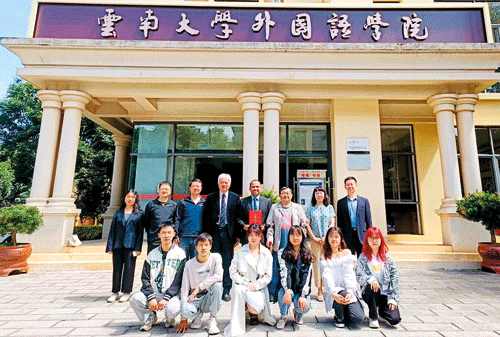Passage to Lanka, its language and culture

New Sinhala library for Yunnan: Sugath Rathnayake (standing centre) with the Deans, Deputy Deans, teachers and students
When Sugath Rathnayake recently opened the first Sinhala library at the prestigious Yunnan University in China, he was offering his 20 undergraduate students a veritable passage to Lanka; an intimate rendezvous with a language and culture with which the land of the dragons had historical ties.
The former journalist turned academic is the first foreign teacher in the fledgling Sinhala Department at the School of Foreign Languages in Yunnan, begun in 2020.
Sugath has already found the first intake impressive. “Chinese students are excellent at learning foreign languages,” he says. “They grasp languages within a very short period of time.” Already they can read “any Sinhala book” and can “speak and make presentations in Sinhala.”
Yunnan is only the fourth university in China to teach Sinhala, but its standards are diligent. There are speech competitions and students “compete so well.” Short, simple drama and children’s songs are practised.
As the only native speaker in the campus Sugath frequently has to tutor the other Sinhala teachers who are Chinese. Says Sugath, “I help them in preparing their lessons. It is easy to teach them because they have a good knowledge and understanding of the Sinhala language and society.”
Sugath was first daunted by the question “where to start?” After the alphabet it was two letter words then three letter words. The obstacles in pronunciation disappeared soon, though the distinction between the spoken language and the written confuses.
This semester Sugath teaches Sri Lankan cinema appreciation and television work. From Kadawunu Poronduwa (the first Sinhala film) to the children’s movie Ho Gana Pokuna, passing through such classics as Sath Samudura and Nidhanaya, it is a fresh and enjoyable immersion into Sinhala culture.
The curriculum is rich and varied – from the thespian tradition of Maname and Sinhabahu to exploring the legacy of literary figures like Martin Wickramasinghe, Prof. Ediriweera Sarachchandra, musicians like Dr. W. D. Amaradeva, and cinematographers like Dr. Lester James Peries. There’s also the robust native folklore, folktales and Jataka stories woven into the course.
The classic emotional climax of Maname, when the princess betrays the prince by passing his sword to the Veddah king, elicited many critical responses from an engrossed class, says Sugath. They also responded keenly to the tragedy of the film Purahanda Kaluwara, where a blind old man, waiting for the drought to end, receives the dead body of his soldier son on the day when rains fall.
To lighten things they would also chorus nursery ditties like ‘Ha ha hari hawa’. “Sometimes I talk to them like to the smallest child in Sri Lanka,” says Sugath explaining that speech has to be very slowly articulated.
Nonetheless they are excited to make these daily excursions to the heart of a new language and culture.
“I work hard to keep that happiness always. Therefore, I cannot be a traditional teacher.”
Slipping in many a life lesson, Sugath says he teaches keeping in mind the old Chinese proverb, “give a man a fish, and you feed him for a day; teach a man to fish, and you feed him for a lifetime.”
Having studied up to his MPhil at the Kelaniya University, Sugath began his career as a news reporter, and still indulges in writing occasionally to the China Daily or the People’s Daily.
The new library, with a 1000 books to start with, was made possible with the help of Sugath’s wife Nethika and their 10-year-old daughter Ihansa who broke her piggy bank and donated the collection for books.
The Ministry of Education and the Read Plus Consortium pitched in and Sugath thanks Prof. Liu Shusen, Dean, School of Foreign Languages, Yunnan University, Prof. Wang Hao, Deputy Dean, and Lu Ye, Teacher, Department of Sinhala Studies.
Searching for an ideal partner? Find your soul mate on Hitad.lk, Sri Lanka's favourite marriage proposals page. With Hitad.lk matrimonial advertisements you have access to thousands of ads from potential suitors who are looking for someone just like you.


